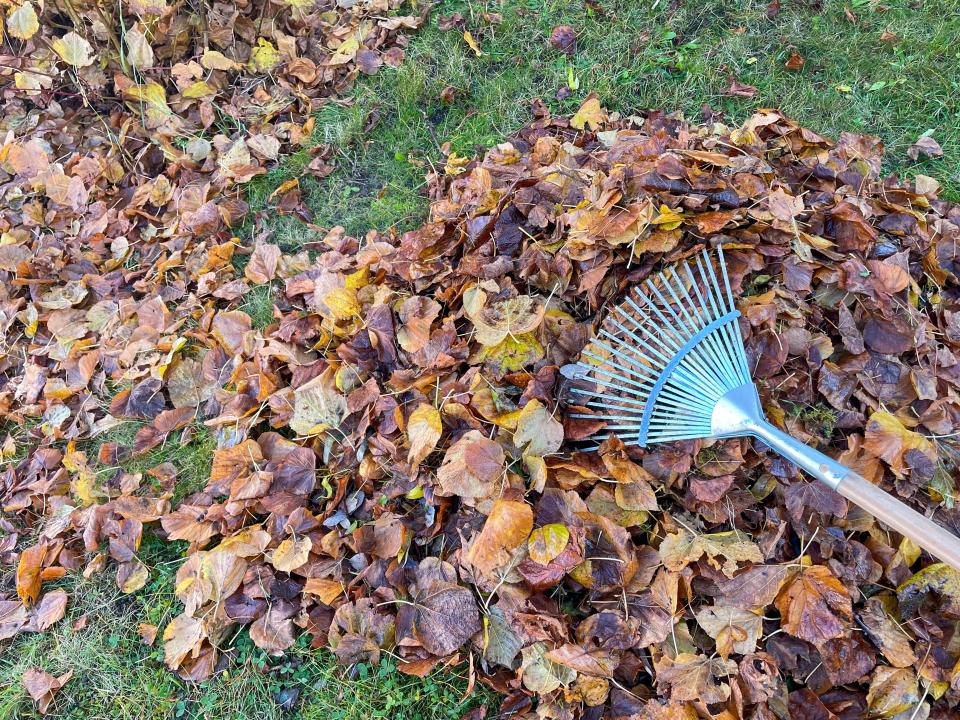Should I rake my leaves this fall? Experts say that's not always a good idea. Here's why.
Autumn is upon us, and for many regions around the country, that means the leaves are changing color and falling off the trees and into the yard. But this fall, think twice before you spend a Saturday raking leaves.
If done correctly, there are environmental benefits to leaving your leaves on the ground to decompose instead of raking and bagging them, experts say, that can not only help your trees and other plants, but also the animals living in your yard.
Of course, the choice whether or not to leave the leaves is ultimately up to you. Here's what to know before you pick up a rake this season.

Is not raking leaves good for the environment?
There are benefits and drawbacks, in making the annual choice to pick up the rake, Lou Meyer, a business developer for The Davey Tree Expert Company’s mid-Atlantic region, told USA TODAY.
If you're leaving the leaves in your yard in whatever way you choose, you're not sending them to a landfill. While some municipalities will vacuum leaves and compost them, many don't, Meyer said. Leaves sitting in a landfill don't biodegrade well due to how landfills are filled, and release methane, which accounts for about 11.5% of greenhouse gas emissions, according to the U.S. Environmental Protection Agency.
It's leaf peeping season! Here's the best way to catch the changing foliage this fall.
How can leaves help my yard?
Leaves can provide a habitat for wildlife, from microscopic creatures to pollinators or other small animals like salamanders, box turtles and toads.
"I understand if people don't want (creatures) running around the backyard, but as we develop more and more spaces, we're taking away the habitats for those creatures," Meyer said. "If you have a large yard, and have an area where you don't spend a lot of time and could possibly support the idea of having a habitat area, every little thing we can do to help nature helps."
Leaves also decompose and return nutrients to the soil. As they break down, they become food for trees, and the nutrients and carbon returns to the soil to help create new leaves in the following years. When we remove leaves in urban and suburban settings, Meyer said we don't allow those nutrients to return to the soil, and trees could run out of food.
Can I mow leaves instead of raking them?
That's a good idea. Meyer recommends shredding leaves with a lawn mower, preferably on a dry day to avoid the wet leaves getting "gunky." You can also rake the leaves off to one side of your yard, or blow or rake the leaves to a wooded or bed area of the yard. Big leaves that haven't been mowed or shredded are more likely to blow away, Meyer said, as piles of leaves tend to cling together.
You should also be cognizant of any drains on your property, as piles of leaves could clog those drains.
But you won't see those leaves decompose right away: It takes a couple of years for leaves to fully break down and become available as nutrients for the soil, Meyer said. Even if the ground freezes, leaves will continue to decompose as long as there is oxygen or water available, although a freeze will probably slow the process down.
Just as tree species are diverse, so are the leaf drops. Meyer recommends to break up the leaf removal or breakdown into smaller chunks, so it is more manageable.
You're raking leaves wrong: Here's how to do it right
When should I rake my leaves?
Leaving your leaves may not always be the best idea, Meyer said, if those leaves that fall are diseased. If those leaves are left, spores may get tossed into the air and fall on new leaves in the spring, causing a decline in the tree's life cycle.
"We want to harvest those leaves as quickly as possible to help protect the trees," Meyer said.
If you suspect your tree may be diseased, Meyer recommends to contact an arborist, who will offer services to manage those diseases.
Leaving leaves in large pieces can also cause diseases to your lawn. Turf needs sunlight, so a thick layer of leaves on top can cause it to die out and allow diseases to get in.
This article originally appeared on USA TODAY: Should you rake leaves this fall? Leaving them might help your lawn

